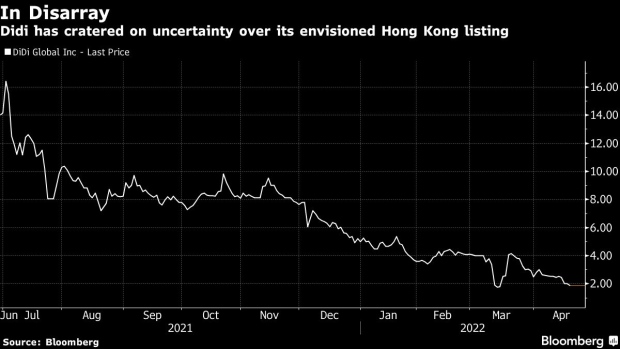Apr 21, 2022
Didi’s Fate in Limbo After Officials Object to Proposed Penalty
, Bloomberg News

(Bloomberg) -- Senior Chinese officials have pushed back on a set of proposed punishments for Didi Global Inc. submitted by the nation’s cybersecurity regulator, people familiar with the matter said, leaving the future of the troubled ride-hailing giant in limbo.
Didi has been in talks with the Cyberspace Administration of China about a fine and other penalties after proceeding with a U.S. initial public offering last June over the regulator’s objections, the people said. The agency had aimed to publish the results of that probe in April but central government officials told the CAC they’re not satisfied with the proposed punishments and asked for revisions, the people said. The officials felt the remedies were too lenient, one person said, asking not to be identified because the matter is private.
That’s why Didi suspended plans for a Hong Kong listing, the people said, adding that it’s uncertain when that dispute could be resolved.
The result is that Didi, once the most celebrated startup in China, faces yet more uncertainty as it prepares to depart New York bourses under orders from Beijing. The company, once worth about $80 billion, will likely see its stock traded over the counter on the so-called pink-sheets market, home to penny stocks and other riskier businesses. Didi said last week it hadn’t applied to move to another exchange, surprising investors who anticipated a smoother transition.
Didi’s shareholders -- which include marquee names from Fidelity Investments to Blackrock Inc. -- have so far refrained from public comment on the delisting. The Chinese company briefed several investors on the potential relegation of its stock and at least one of them was unhappy with the latest development, one of the people said. Some investors could be forced to sell because their mandates don’t allow them to hold unlisted shares. Japan’s SoftBank Group Corp., which can hold unlisted stock and plowed more than $12 billion into the company, has seen its 20% stake fall from a peak of about $16 billion to less than $2 billion.
Representatives for Didi and the CAC didn’t respond to requests for comment on the penalties. A Didi spokesperson previously referred Bloomberg to their April 16 statement, which stated the option of trading on the pink-sheet market.
Read More: Didi’s Move from NYSE to Hong Kong - What to Know: QuickTake
The settlement delay is another setback for Didi, the national champion that defeated Uber Technologies Inc. before becoming one of the biggest targets of a tech-sector crackdown. Days after its $4.4 billion IPO, the company was placed under a cybersecurity probe and its services were taken off the country’s app stores. The debut was so controversial it triggered an onslaught of regulatory actions constraining Chinese companies from raising capital overseas.
It’s unclear what measures the CAC recommended. The ride-hailing giant has explored several alternatives including hiving off data to a third-party Chinese firm and selling a stake to state-backed companies, Bloomberg News has reported. The China Securities Regulatory Commission said in a statement after last week’s announcement that Didi made the decision to delist based on the market and its own situation.
The lingering uncertainty around Didi’s fate is contributing to persistent questions over Beijing’s longer-term intentions for a giant internet industry it regards as having amassed too much wealth and power.
Shareholders will vote May 23 on Didi’s delisting plan, which is almost certain to pass given co-founders Cheng Wei and Jean Liu have majority voting control. The stock will then be traded as a pink-sheet for an indefinite period of time, said people familiar with the matter.
Although some non-American blue-chip names trade over the counter, pink sheets -- named for the traditional hue of the share slips -- are typically the province of highly speculative securities that won’t or don’t meet the stricter requirements of the main bourse. Examples include Luckin Coffee Inc., the once high-flying Chinese challenger to Starbucks that admitted to inflating sales.
China Markets Are Only ‘Uninvestable’ for Slackers: Shuli Ren
©2022 Bloomberg L.P.





